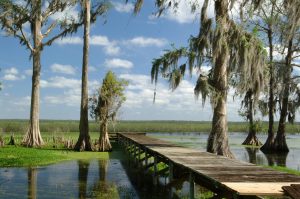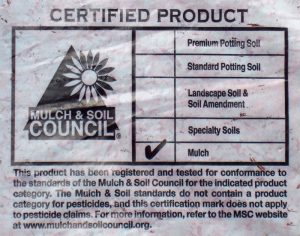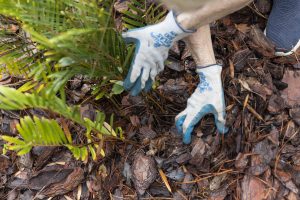Is your garden or landscape Florida friendly? Meaning, is your landscape in harmony with the climate and growing conditions we have here in Florida? Well, to make it easy the University of Florida Institute of Food and Agricultural Sciences (UF/IFAS) created the Florida-Friendly Landscaping™ (FFL) program. Since the early 1990s, the Florida-Friendly Landscaping™ (FFL) premier program has promoted sustainable alternatives to ‘conventional’ landscaping, providing guidance on low impact, economically friendly, science-based landscape practices that require less water and reduce pollutants leeching into Florida’s waters.
The program is centered on 9 FFL principles that promote sustainable landscape design and operation and focuses on protocols to reduce the need for fertilizers and pesticides. FFL Principle No. 4, promotes the benefits and proper use of sustainably sourced mulch.
Principle No. 4
Mulch in the garden or landscape has many benefits. Retain soil moisture, control weed growth and discourage insect pests and plant pathogens with the proper use of mulch. Read more about recommended mulch practices.
Types of Mulch
Mulch is the use of any material to cover the base of plants. There are two broad types of mulch: organic and synthetic.
Organic mulch is derived from natural material such as grass clippings, leaves, needles, wood, and bark. You may have natural mulch in your yard if your big oak tree has shed its leaves on top of your garden. Pine bark, pine needles, eucalyptus, melaleuca, and utility/yard waste are common organic mulches. Organic mulches slowly decompose, which provides low levels of plant nutrient. This also means it needs to be replaced annually or bi-annually. Sustainably sources mulch can be used anywhere in the garden to prevent weeds and hold onto moisture in the soil, a 2-to-3-inch layer is all you need.
- Note that artificially colored mulches are generally made of hardwood or recycled building materials, which may be contaminated or treated with chromated copper arsenate (CCA). CCA is toxic to animals and people and should be avoided. Colored mulch should only be used if it has a certified MSC Certification Logo.

Leaf litter is a natural type of mulch!
Synthetic mulches are manufactured, mostly from plastic or recycled rubber. These mulches are not considered Florida friendly. There is no nutritional benefit to using synthetic mulch and it does not break down. Synthetic mulch is only decorative, not functional or beneficial to your plants. Additionally, rubber mulch may leak small amounts of chemicals into the soil. Rocks cannot be used as a substitute for mulch and are not considered Florida friendly. Rocks can be used as a hardscape for decorative purposes, but the use of rocks with plants is discouraged. If your plants are not doing so well, check to see if they are surrounded by rocks. Rocks can increase the pH of the soil and cause heat damage which is detrimental to plants.
Beware: Cypress mulch should be avoided since it may come from Florida’s ecologically sensitive forested wetlands. It is hard to determine if this type of mulch is sustainably sourced, which can be detrimental to endangered ecosystems.

Benefits of Using Mulch
Much has many benefits:
- Nourishes soil: Organic mulch decomposes and can be tilled into soil for additional nutrients and maintain pH. Mulch can be used as an amendment to slowly lower soil pH over time.
- Suppresses weeds: Mulch reduces the amount of sunlight on the soil layer, suppressing weed growth and the need to manually pull weeds or use herbicides.
- Conserves water: Organic mulch retains moisture in the soil, lowering the frequency of waterings and reduces leeching of fertilizer from the soil.
- Regulates temperature: Mulch insulates plant roots and protects plants against fluctuations in temperature.
- Prevents erosion: A mulch layer is the first defense against the elements that threaten soil erosion.
- Aesthetic appeal: Mulch can improve the aesthetic appeal of landscape.
Note that artificially colored mulches are generally made of hardwood or recycled building materials, which may be contaminated or treated with chromated copper arsenate (CCA). CCA is toxic to animals and people and should be avoided. Colored mulch should only be used If it has a certified MSC Certification Logo. Additionally, rocks are not mulch and cannot be used as a substitute. The use of rock is discouraged as plants derive no nutritional benefit and can overheat in direct sunlight.

Proper use of mulch
Mulch is functional and aesthetic when used properly. Mulch can be used by itself in areas that are difficult to mow, irrigate, or grow plants to maintain curb appeal. Before adding mulch to a landscape with plants, weed the area first. Then add a 2–3-inch layer around trees, shrubs and bedding plants. It is important to keep the depth uniform throughout the garden. Don’t mulch to the curb, sidewalk, or water’s edge, since organic mulches degrade and synthetic mulches leech chemicals, it is best to use a buffer of grass or groundcover to prevent nutrients and chemicals from leeching into storm drains and bodies of water. Don’t be the person who “volcano mulches”, or piles mulch against a tree trunk or the stems of the plants. This is harmful to the tree and other plants, as it holds moisture against the trunk, causing rot and inviting pests and diseases. Instead, keep the mulch layer 12-18 inches from any tree trunk.

Summary
Mulching has many benefits to you, your garden or landscape, and the environment. Just make sure the mulch you purchase is sustainably sourced and safe for its intended use. To read more about this, check out this publication.
To learn more about The 9 Principles of Florida-Friendly Landscaping™, click here. We can all play a role in protecting Florida’s natural resources. After you take the pledge, this pdf of FFL Tips and Resources can help you get started or find more ways to make your landscape Florida-Friendly.
Have a question?
If you have any questions about gardening in Central Florida, please contact UF/IFAS Extension Pasco County at 352-518-0156. For more information on UF/IFAS Extension Pasco County Community Gardens, and how you can join one, visit http://sfyl.ifas.ufl.edu/pasco/. Supervising agent: Dr. Whitney Elmore.
Follow us!
We have several ways to connect. Visit our Facebook, Instagram, Eventbrite, Blogs, Florida-Friendly Facebook, & Website.
 4
4

